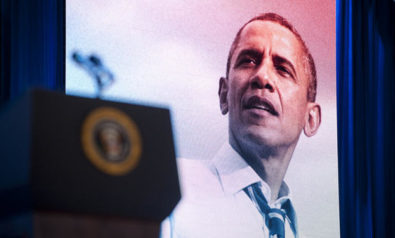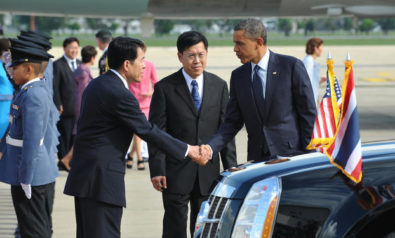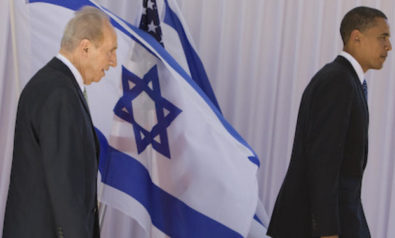
Obama's promised domestic focus in his second term may coincide with a cautionary approach to foreign policy.
Background
Washington DC is buzzing in anticipation for the Presidential Inauguration: signs adorn the Metro, and the National Mall have already been sectioned off in preparation for the ceremonies. Turnout estimates range between 600,000 and 800,000 – sizable numbers, but a long shot from 2009's historic crowd of 1.8 million.
Nearly all US presidents elected to a second term have seen their popularity wane. Negotiating with an uncooperative Congress is often the most difficult challenge faced by incumbents, and as new legislature is stalled, public fatigue is inevitable.
Obama won re-election on a platform bearing the slogan "Our People. Our Future," promising a renewed focus on resolving issues "right here at home." The administration believes that America needs to work on its domestic issues, such as job creation, education, immigration reform, and gun control, in order to maintain its’ global competitiveness.
A domestic focus, on some level, implies a retreat on the international stage. Yet the world shows no sign of slowing down; security issues in the Middle East and economic relations with China are just two of the many pressing issues on Obama's foreign agenda.
Why is this relevant?
Obama's domestic issues have not noticeably changed since his first term. The economy, in its state of gradual recovery, is still the central issue. Obama has proposed increasing taxes on the upper class – a promise he broke in his first term. He has also outlined manufacturing and energy initiatives, along with infrastructure changes, designed to boost the economy.
During the recent campaign, Obama repeatedly stressed the need for a second term to "finish what we started." Obamacare, which will go into effect in 2014, is among the initiatives he was referencing. Much legislative work still needs to be completed on the bill. Other relevant domestic issues include gun control, following the Sandy Hook tragedy, climate change, in the wake of Hurricane Sandy, and immigration reform, following Obama's massive popularity among the Latino community.
The international sphere, in contrast, has changed much in the past four years. Withdrawal of US troops in Afghanistan is a vital issue that was stressed repeatedly during the campaign, and would mark the conclusion of a bitter and prolonged conflict. Obama’s cautious dealings in today’s transforming Arab world have been largely successful at defusing tension, without engendering deep US involvement.
The Asia-Pacific pivot will continue to shift foreign policy towards that continent. As China's influence continues to grow, Obama will have to encourage deeper, more transparent cooperation between the two nations. The two are the economically co-dependent superpowers of the world, and as such, a more sustainable relationship is essential. The pivot will also draw foreign involvement away from Europe. As the euro zone crisis plays out, Obama will likely continue a policy of limited involvement.
US sanctions on Iran have been effective at hurting the nation's economy, but questions remain as to whether or not this could discourage the country’s nuclear ambitions, or bolster them. As the Asia-Pacific pivot has become increasingly real, defusing military tensions has become a greater priority in the East. Obama continued to show this commitment to peace-keeping by joining the rest of the world in criticizing Israel's illegal settlements in the West Bank. Whilst Israel’s settlement policies have been reprimanded by several US presidents, the private exchange recorded between Obama and former French president Sarkozy about Israeli Prime Minister Netanyahu suggests underlying tensions in the typically strong US-Israel relations.
Despite Obama's proposed refocusing on domestic issues, his international agenda is as dynamic as ever. While foreign entanglements are rarely popular, especially in a time of economic strain and high unemployment, Obama's proven competence as a diplomat may lead him into success in the new term.
For more than 10 years, Fair Observer has been free, fair and independent. No billionaire owns us, no advertisers control us. We are a reader-supported nonprofit. Unlike many other publications, we keep our content free for readers regardless of where they live or whether they can afford to pay. We have no paywalls and no ads.
In the post-truth era of fake news, echo chambers and filter bubbles, we publish a plurality of perspectives from around the world. Anyone can publish with us, but everyone goes through a rigorous editorial process. So, you get fact-checked, well-reasoned content instead of noise.
We publish 2,500+ voices from 90+ countries. We also conduct education and training programs on subjects ranging from digital media and journalism to writing and critical thinking. This doesn’t come cheap. Servers, editors, trainers and web developers cost money.
Please consider supporting us on a regular basis as a recurring donor or a sustaining member.
Support Fair Observer
We rely on your support for our independence, diversity and quality.
Will you support FO’s journalism?
We rely on your support for our independence, diversity and quality.







